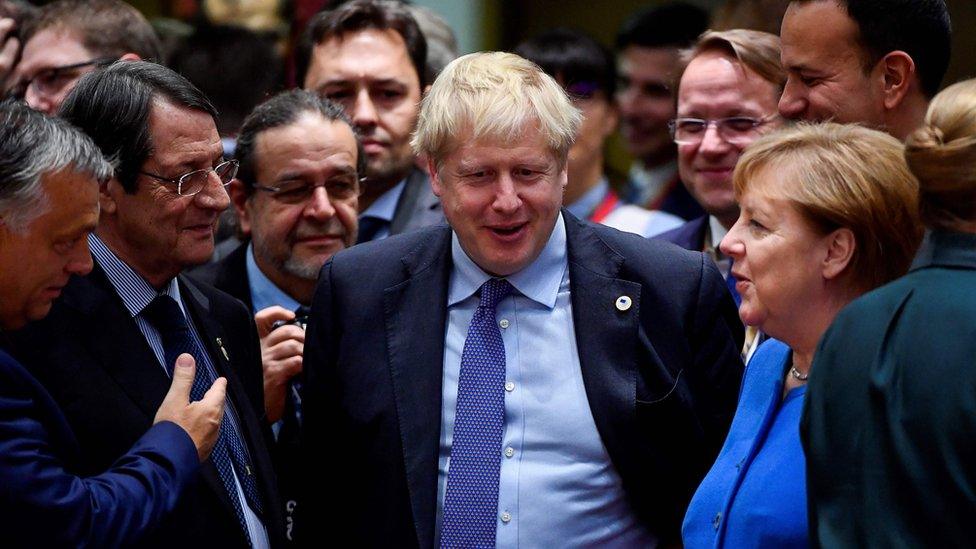Brexit deal: Five reasons EU is happy with revised deal
- Published

Boris Johnson was surrounded by EU leaders after the deal was announced at the Brussels summit
The EU and UK have reached an agreement widely hailed by European leaders as a significant step. But the deal still has to get past the UK Parliament, so why does Europe appear so keen?
1) Lots of it is the same
Ninety-five per cent of this revised deal is the deal agreed with Prime Minister Boris Johnson's predecessor, Theresa May, during two years of painstaking negotiations.
Citizens' rights. Money. Ongoing cases at the European Court of Justice. The data of EU citizens stored in the UK. Under this deal, they would all be secured.
EU President Jean-Claude Juncker says the deal provides "certainty"
Unveiling the deal, EU chief negotiator Michel Barnier said: "This text… provides legal certainty and certainty where Brexit creates uncertainty."
2) The Irish border issue is solved… for a bit
With some creative thinking, clever drafting and some give-and-take, the EU and UK have revived the original Northern Ireland-only backstop but with some key differences.
"We shifted our positions but within our principles," a member of Team Barnier told me soon after the deal was agreed.
In black and white, Northern Ireland is in the UK's customs territory but in reality the EU's customs processes will apply, although it might not always feel that way because of exemptions, rebates and other tweaks.
3) Then it'll be up to the Northern Irish people to decide
The long-term future of the Irish border will be in the hands of the people of Northern Ireland through a vote in the Northern Ireland Assembly at Stormont after four years, and then a further four or eight years later.
"It creates a unique solution for Northern Ireland" - Leo Varadkar
If Stormont decides it's happy to change the status quo and accept a harder border then it's Stormont's choice - not Dublin's, not London's, not Brussels'.
4) The single market is still protected
Northern Ireland will follow pages and pages of EU rules on agriculture and goods. Items entering Northern Ireland will be checked for compliance with those regulations.
That reduces the risk of dodgy goods ending up in France, Belgium, Finland or the rest of the member states. The single market will be physically protected.
Breaches of those rules can be sent to the European Court of Justice, which means the EU's highest court still administers EU law. The single market will be legally protected.
5) Boris Johnson has said it will get through Parliament
As the French President Emmanuel Macron said when he arrived at the summit, Boris Johnson assured him he had the votes to get this agreement through the House of Commons.
If there's a hiccup then there's always the safety valve of an extension to the Brexit deadline, despite what leaders are currently saying.
- Published17 October 2019